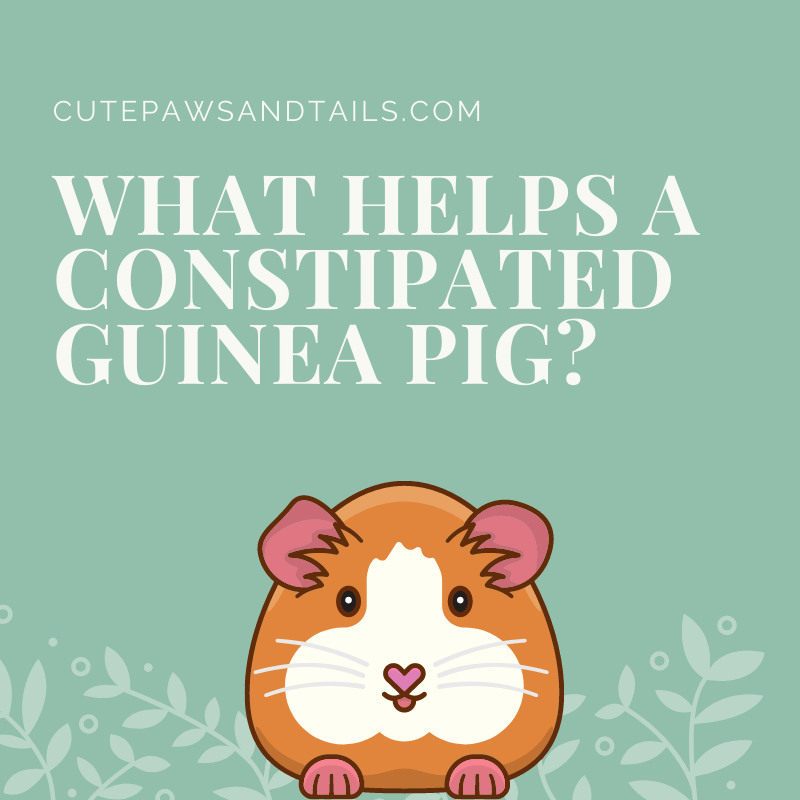Guinea pigs are extremely sensitive animals in all aspects of their lives, from their skin, faces, to what they eat. In general, their diet consists of hay, vegetables, and other foods rich in Vitamin C. However, they have sensitive digestive tracts that could cause problems if they eat something they should not. For instance, what is the best approach if a guinea pig develops constipation problems?
The best way to help a constipated guinea pig is to apply oil drops to its abdomen and press on the sides until it defecates. It is also best to feed the animal probiotics to kick-start their digestive systems. Nevertheless, you should merely do all this after contacting a veterinarian.
Guinea pigs rarely get sick, but when they do, it is quite sad for them. I have compiled several findings in this article that may be of great assistance to you. Be sure to read on for more information on quick responses in case your guinea pig becomes ill.
What Causes a Guinea Pig to Be Constipated?
In humans and almost all animals, constipation is a result of eating unhealthy foods, or a lack of water in the body. The situation is similar in guinea pigs as well. As soon as you notice the guinea pig swelling in its abdomen or straining in its bowel movements, you must take action immediately to save the pet’s life.
However, here are some of the common problems of constipation in guinea pigs.
- Poor Diet
It is important to feed Guinea pigs their special diets to avoid problems such as constipation and other issues. Their diet includes hay to wear down their teeth, as well as fresh fruits and vegetables rich in fiber that helps prevent constipation. In general, feed these meals to your guinea pig at least once a day.
Guinea pigs usually get constipated from not eating enough fruit and vegetables, so if you are not giving them these as treats, you need to give them in the right portion. Giving huge portions at once for an animal that was not used to it can lead the animal to diarrhea.
- Dehydration
In the same way that you drink water to aid in digestion, guinea pigs also need adequate amounts of fresh water each day. The fact that guinea pigs have sensitive intestines makes dehydration even more serious; so if you fail to provide water, you may kill them.
Further, during the summer months and in hotter regions, many people choose to provide guinea pigs with water and other supplements, such as fresh cucumbers, for their meals. It is also clear that cucumbers have higher water content, and so offering them to your guinea pig will increase its hydration levels.
- A Blockage in the Intestines
Sometimes guinea pigs feed on substances they should not eat; this stuff ends up blocking the pet’s intestines. However, sometimes it also results from eating dry foods without taking water. This blockage is overly serious and in case you notice any bloating, or discoloration of the abdomen, it means you should reach a veterinarian as fast as possible.
- Anal Impaction
Occasionally, guinea pigs need to eat their droppings to maintain smooth health. However, failure to do this affects mostly the aged guinea pigs and you may need to visit a veterinarian for professional help.
What Helps a Constipated Guinea Pig?
Even though constipation problems are rare in guinea pigs, you should always feed them fresh fruits and vegetables rich in fiber to prevent constipation. Nevertheless, you can help your pig if he has constipation problems in the following ways:
- Evacuation Using Your Hands
Bloats on the abdomen of the guinea pig could mean the pig has a stuck poop right at its abdomen, a problem that also occurs in most male guinea pigs at ages of 2 to 3 years. To help the pet:
- Wear a pair of gloves and drop few drops of olive oil on the pet’s abdomen
- You can also wash the abdomen with warm water to soften the stuck droppings.
- Gently squeeze the blocked mass out by placing your thumb and pointer finger on opposite sides of the anus.
You may have to repeat this process several times until the bloating subsides, then continue it until the pet appears to be bowel-free again.
- Dietary Adjustments
To help loosen the guinea pig’s bowels, you may want to purchase fiber-rich vegetables and fruits such as bananas for the pet; however, avoid raw beans and cabbages, which may produce gases and cause more bloating.
- Ensure there is a clean water bottle full of fresh water changed daily.
- Supplement your guinea pig’s diet with probiotic supplements from pet stores. Probiotic supplements are special guinea pig supplements that are important for reviving their digestive tracts. Be watchful not to feed the pet with what a human would take because of the difference in their digestive systems
Avoid forcing the pet to eat, instead contact a veterinarian to guide you along on how to help the animal.
What are the Symptoms of Constipation in Guinea Pigs?
Constipation is a common problem in several animals but quite rare in guinea pigs. However, you can spot it by either of the following symptoms:
- Straining to Pass Droppings
In such cases, the stool piles up so that it is too big to fit through the animal’s anus; thus, the animal has to strain in great pain to defecate.
- Swollen Belly
The animal may jerk off if you touch a swelling in its belly, indicating pain or discomfort. Most of these swellings result from stool accumulation in the gut.
- No Droppings in the Animal’s Cage
The reason you need to clean your guinea pig’s cage in person more often is that you can spot these problems. If there is little or no stool, that is a warning signal that something needs fixing immediately.
- Inability to Urine
The accumulation of stool in the gut can squeeze the urinary duct of the animal, which is a reason for you to act immediately. You may also notice the animal urinating painful drops.
https://veterinaryemergencygroup.com/blog/bunny-guinea-pig-not-pooping/#



